
- Subject:
- Political Science
- Material Type:
- Unit of Study
- Provider:
- Rice University
- Provider Set:
- OpenStax College





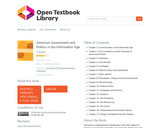
This text is a comprehensive introduction to the vital subject of American government and politics. Governments decide who gets what, when, how (See Harold D. Lasswell, Politics: Who Gets What, When, How, [New York: McGraw-Hill, 1936]); they make policies and pass laws that are binding on all a society’s members; they decide about taxation and spending, benefits and costs, even life and death.Governments possess power—the ability to gain compliance and to get people under their jurisdiction to obey them—and they may exercise their power by using the police and military to enforce their decisions. However, power need not involve the exercise of force or compulsion; people often obey because they think it is in their interest to do so, they have no reason to disobey, or they fear punishment. Above all, people obey their government because it has authority; its power is seen by people as rightfully held, as legitimate. People can grant their government legitimacy because they have been socialized to do so; because there are processes, such as elections, that enable them to choose and change their rulers; and because they believe that their governing institutions operate justly.Politics is the process by which leaders are selected and policy decisions are made and executed. It involves people and groups, both inside and outside of government, engaged in deliberation and debate, disagreement and conflict, cooperation and consensus, and power struggles.In covering American government and politics, this text introduces the intricacies of the Constitution, the complexities of federalism, the meanings of civil liberties, and the conflicts over civil rights;explains how people are socialized to politics, acquire and express opinions, and participate in political life; describes interest groups, political parties, and elections—the intermediaries that link people to government and politics; details the branches of government and how they operate; and shows how policies are made and affect people’s lives.
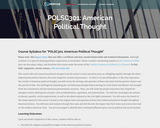
This course will cover American political thought from the nation's founding through the 1960s, exploring the political theories that have shaped its governance. As there is no one philosopher or idea that represents the totality of American political thought, the student will survey the writings and speeches of those who have had the greatest impact over this period of time. Much of the study required in this course is based on the original texts and speeches of those who influenced political thought throughout American history. The student will learn and understand the impact that their views and actions have had on the modern American state. Upon successful completion of this course, students will be able to: describe the religious and political origins of the American political system; explain how Enlightenment thinkers, such as John Locke, Thomas Hobbes, and Jean-Jacques Rousseau, and Baron de Montesquieu, influenced the political philosophies of American founding fathers; analyze how the colonial American experience shaped many of the core values represented in American government and expressed in the Declaration of Independence and the U.S. Constitution; compare and contrast the differing opinions on the role of the government that the founders expressed; trace the development and evolution of the concepts of 'states rights' and 'federal (national) supremacy'; connect the observations of De Tocqueville in Democracy in America to the concepts of equality, individuality, and civic engagement in American political discourse; examine the evolution of race in the American political system (from slavery to the 2008 election of Barack Obama); discuss the changes in the political role of women in America from its colonial days to the present; connect the concept of 'American Exceptionalism' to the industrial revolution, capitalism, and imperialism; analyze the roots of reform in the Progressive Era and their impact on modern political discourse; explain major principles of American foreign relations over time; assess the purpose and impact of ĺÎĺĺĺŤAmerican war rhetoricĄ_ĺĺö over time; differentiate between 'liberal' and 'conservative' political beliefs in modern American government; illustrate how the political turmoil in the 1960s greatly shaped contemporary American political discourse; evaluate the current political discourse as represented in the 2008 and 2010 elections. (Political Science 301)
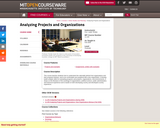
"This course teaches students how to understand the rationality behind how organizations and their programs behave, and to be comfortable and analytical with a live organization. It thereby builds analytic skills for evaluating programs and projects, organizations, and environments. It draws on the literature of the sociology of organizations, political science, public administration, and historical experience-and is based on both developing-country and developed-country experience."

Written as events unfolded, this edited collection of articles offers insightful and diverse perspectives on the Arab uprising, and expands to consider related political unrest outside the predominantly Arab world.
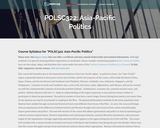
This course will introduce the student to the international relations of the Asia-Pacific region. Globalization, economic ties, national security issues, and politico-military alliances with the U.S. make an understanding of this region important to any political science student or participant in American government. This course will examine the differences between Western political thought and the general philosophical outlooks of the Asian population, which have been molded by societal forces for thousands of years. It will also address politics in Asia by examining pre-colonial systems of government, Western imperialism, national liberation movements, and proxy wars fought by the Superpowers in the Cold War. This course is important because the Asia-Pacific has given rise to several of the U.S.'s major security concerns: financial support of the U.S. economy by China and Japan through the purchase of U.S. government debt securities, conflict with China over Taiwan, North Korea's nuclear weapons program, separatist movements in several of the smaller Pacific Rim nations, and the growth and support of transnational terrorism within the region. Upon successful completion of this course, the student will be able to: explain how religion and culture impact government and political systems in Eastern Asia; discuss philosophies of government in Eastern Asia from ancient times to the present; identify the ways in which Western imperialism has impacted Eastern Asia; demonstrate an understanding of systems of governance currently in existence in Eastern Asia; analyze contemporary political and security issues in Eastern Asia that may impact U.S. national interests; assess the relationship that exists between economic development, systems of governance, and political stability of a Third World nation. (Political Science 322)
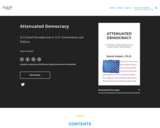
Part 1: Thinking Like a Political Scientist
Chapter 1: What is Politics
Chapter 2: The Nature of Political Power
Chapter 3: Who Has Power in U. S. Politics?
Chapter 4: Political Science as a Social Science
Chapter 5: Common Fallacies in Argumentation
Chapter 6: Making Strong Arguments
Chapter 7: Basic Political Analysis
Chapter 8: Six Very Powerful Questions
Chapter 9: Critical Reading and Reflection
Chapter 10: The Context of U. S. Government and Politics
Part 2: Constitutional Foundations
Chapter 11: Natural Rights and the Declaration of Independence
Chapter 12: Articles of Confederation, Shays' Rebellion and the Road to the Constitution
Chapter 13: Key Features of the U. S. Constitution
Chapter 14: The Battle for Ratification and the Bill of Rights
Chapter 15: A Federal Republic
Chapter 16: Federalism's Historical Development
Chapter 17: A Secular Republic
Chapter 18: Amending the Constitution
Chapter 19: How Democratic is the U. S. Constitution?
Part 3: Congress
Chapter 20: Who are Our Members of Congress and Whom Do They Represent?
Chapter 21: Congressional Roles
Chapter 22: How Congress Passes Legislation
Chapter 23: Pathologies of Congressional Behavior
Chapter 24: The Undemocratic Senate
Part 4: The Presidency
Chapter 25: The President as Person and Institution
Chapter 26: The Vice President and Presidential Succession
Chapter 27: The President's Domestic Powers
Chapter 28: The President's Foreign Policy Powers
Chapter 29: Contemporary Issues of Presidential Power
Chapter 30: Impeachment and Removal of the President
Part 5: The Supreme Court
Chapter 31: Purpose and Operation of the Supreme Court
Chapter 32: Paths to the Supreme Court
Chapter 33: Appointing and Confirming Supreme Court Justices
Chapter 34: The Interpretive Work of the Supreme Court
Chapter 35: The Supreme Court as an Ideological Actor
Part 6: The Federal Bureaucracy
Chapter 36: Government is Good
Chapter 37: The Scope and Size of the Federal Government
Chapter 38: The Work of the Federal Civil Service and Political Appointees
Chapter 39: Revolving Doors and Corporate Capture of Federal Agencies
Chapter 40: American Budget Priorities
Part 7: Linkage Institutions
Chapter 41: What Do Political Parties Do?
Chapter 42: The Historical Development of American Political Parties
Chapter 43: Policy Preferences of American Political Parties
Chapter 44: Why Do We Have a Two-Party System?
Chapter 45: The Universe of Organized Interests
Chapter 46: Strategies of Organized Interests
Chapter 47: The Historical Development of the News Media
Chapter 48: The Contemporary News Media Ecosystem
Part 8: Electoral Politics and Public Opinion
Chapter 49: Expanding Voting Eligibility in American History
Chapter 50: Early Election Reforms
Chapter 51: The Electoral College
Chapter 52: The Integrity of American Elections
Chapter 53: Gerrymandering
Chapter 54: Campaign Finance
Chapter 55: The Advantages of Incumbency
Chapter 56: Public Opinion and Political Socialization
Part 9: Individual Political Behavior
Chapter 57: Voting
Chapter 58: Beyond Voting
Chapter 59: Civil Disobedience
Chapter 60: Political Violence
Chapter 61: A Guide to Living in an Attenuated Democracy
Part 10: Civil Rights and Civil Liberties
Chapter 62: The Difference Between Civil Rights and Civil Liberties
Chapter 63: Incorporation or Nationalization of the Bill of Rights
Chapter 64: The Boundaries of Freedom of Speech and the Press
Chapter 65: The Law and Politics of Religious Freedom
Chapter 66: The Individual and the Criminal Justice System
Chapter 67: Threats to Individual Freedom--Government Versus Corporations
Chapter 68: Civil Rights Case Study--Race
Chapter 69: Civil Rights Case Study--Sex
Chapter 70: Civil Rights Case Study--Sexual Orientation
Access is also available here: https://slcc.pressbooks.pub/attenuateddemocracy/

The U.S. political system suffers from endemic design flaws and is notable for the way that a small subset of Americans—whose interests often don’t align with those of the vast majority of the population—wields disproportionate power. Absent organized and persistent action on the part of ordinary Americans, the system tends to serve the already powerful. That’s why this text is called Attenuated Democracy. To attenuate something is to make it weak or thin. Democracy in America has been thin from the beginning and continues to be so despite some notable progress in voting rights. As political scientists Benjamin Page and Martin Gilens wrote, “The essence of democracy is not just having reasonably satisfactory policies; the essence of democracy is popular control of government, with each citizen having an equal voice.” (1) Since this is likely to be your only college-level course on the American political system, it is important to point out the structural weaknesses of our system and the thin nature of our democracy. Whenever you get the chance—in the voting booth, in your job, perhaps if you hold elected office—I encourage you to do something about America’s attenuated democracy.

This book is a broad introduction to Australian politics and public policy. This field of study is important for Australians to understand the exercise of political power, their history and the scope for change. It is also important for analysts outside Australia looking for comparative cases. Within this volume are diverse topics and perspectives, demonstrating that the study of Australian politics and policy is not ‘fixed’. Rather, it is a contested field of academic scholarship. Indeed, the volume’s editors do not all agree on the content of this introduction!

The Basics of American Government offers a comprehensive overview of the American political system for students taking introductory courses in American national government and combines the best aspects of both a traditional textbook and a reader. The Basics of American Government is a collaborative effort among eight current and one former faculty members in the Department of Political Science & Criminal Justice at the University of North Georgia. Most of its chapters offer a piece of original scholarship as a case study bolstering the material in the chapter. Additionally, most chapters present a civic engagement-type exercise and discussion questions that are challenging and engaging, and help foster student participation in the political system. The purpose of this book is to offer a no-frills, low-cost, yet comprehensive overview of the American political system for students taking introductory courses in American national government.

During recent years the phenomenon of Boko Haram has dominated policy debates among academics and policymakers interested in African and Nigerian politics. Yet, many issues about the sect remain unclear and contested. This collection of articles on Boko Haram by selected experts is essential reading for those interested in Nigeria, and the broader issues of state building, terrorism, humanitarian emergencies, conflict resolution and intrastate violence.

The events of the Arab Spring, beginning in December 2010, saw renewed hope for Arab Civil Society. However, the fall of authoritarian regimes did not always seem to benefit Civil Society – whilst Political Islamic movements often took advantage. In Syria, Iraq, and beyond, groups like the Islamic State are declaring Caliphates in the territories they seize in an attempt to fulfil the Political Islam ideal of a ‘global Islamic Caliphate’ encompassing the Muslim world. This collection of articles aims to address common questions about Political Islam, as well as to provide an assessment of the Islamic State/ISIS/ISIL and finally challenge common understandings on the issue of Islam and democracy.
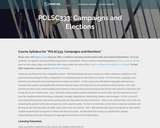
In this course, the student will explore campaigns and elections, learning their purpose and significance and observing the impact that they have on the American political system. The course will focus on the history and evolution of elections and voting laws in the United States, as well as what compels individuals to run for office and how campaigns are structured. Also, the course will teach the student the role that political parties, interest groups, voters, and the media play in elections. Lastly, the student will take a closer look at electoral outcomes and the impact that elections have on public policy after votes are counted, as well as what types of proposals could be implemented to improve our electoral system. Upon successful completion of this course, the student will be able to: explain the importance of elections, voting, democracy, and citizenship in the United States; describe the various types of elections that exist within the American political system; identify the legal and constitutional bases of campaigns and elections in the United States; explain the types of individuals that run for political office and why; analyze the influence of incumbency in elections; explain how candidates develop campaigns and financing; discuss the role of money in political campaigns; discuss the influence of political parties on campaigns and elections; describe the characteristics of the U.S. party system; explain the role of interest groups in influence campaigns and election outcomes; explain the various influences and motivations of the American voter; describe the factors associated with both nonvoter and voter disenfranchisement in contemporary elections; analyze and explain the critical role of the media in campaigns and elections; explain how election outcomes impact government actions and public policy; analyze both historical and contemporary election reforms. (POLSC333)
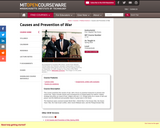
This course examines the causes of war, with a focus on practical measures to prevent and control war. Topics include causes and consequences of misperception by nations; military strategy and policy as cause of war; religion and war; U.S. foreign policy as a cause of war and peace; and the likelihood and possible nature of great wars in the future.
The historical cases covered include World War I, World War II, the Korean War, the Seven Years' War, the Arab-Israel conflict, other recent Mideast wars, and the Peloponnesian War.
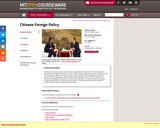
This lecture course provides students with a comprehensive introduction to the international relations of the People's Republic of China. China's foreign relations during the Cold War as well as contemporary diplomatic, security and economic issues will be examined to identify and explain China's foreign policy goals and their implementation since 1949. Throughout, this course will investigate the sources of conflict and cooperation in China's behavior, assessing competing explanations for key events and policies. Readings will be drawn from political science, history, and international relations theory.
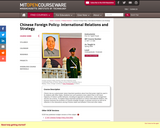
" China's rise as a great power raises important questions about how that power might be used in its relations with other states. Nowhere are such questions more salient than in the future trajectory of China's conflict behavior, including its approach to deterrence, crisis management and the use of force. To explore these important questions in China's international relations, this seminar examines the evolution of Chinese strategic thought, in primary sources as well as its reflection in the interactions among Chinese states and between China and other states."